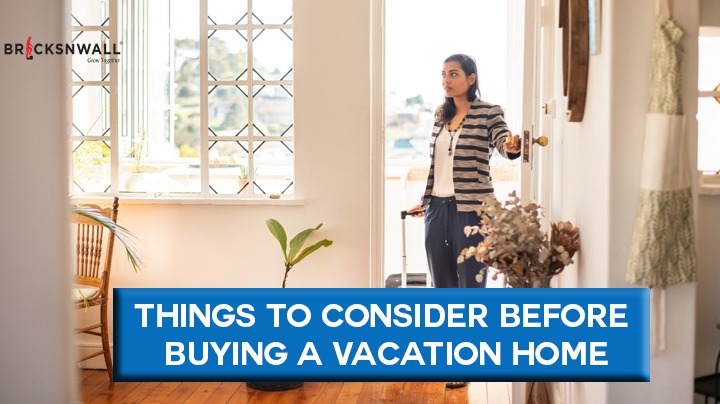Things to Think About Before Purchasing a Vacation House
Bricksnwall Trusted Experts

Although
owning a vacation property may seem ideal, there are issues with rentals and
the housing market to take into account.
Purchasing a
vacation property may seem like the ideal investment, but it's a major choice
that needs careful consideration.
Austin
Allison is the co-founder and CEO of Pacaso, a San Francisco-based real estate
company that seeks to promote second home ownership. "A second home has
countless life-enriching benefits, as it specifically gives you that place to
spend time with friends and family and create memories, which I find to be
super important to set aside time for," Allison explains.
Examine
the Benefits and Drawbacks
Even if you
are dead set on purchasing a vacation property, you must weigh the advantages
and disadvantages.
Among
the benefits are:
For
additional money, you may rent it out. By letting visitors stay in your
holiday house, you can generate passive income.
It
requires investment. A vacation house not only generates revenue from
rentals, but it may also increase in value over time. Value increases are
possible for vacation rentals, particularly in locations where demand is
rising.
You'll
save money on your subsequent trip. A trip to your vacation home could save you
money, as opposed to booking a hotel or other short-term rental.
Benefits
to taxes might exist. Owners of second homes can benefit from
substantial tax breaks, including interest and property tax deductions. When it
comes to taxes on your vacation house or rental, you might want to consult with
a tax expert.
It
might make a great retirement home. Depending on where your vacation house is
located, it might make an excellent retirement community someday.
Cons,
however, also exist:
It
is pricey. You will be responsible for paying the mortgage, property taxes,
insurance, and utilities, just like you would for your primary residence.
Unexpected
costs can arise. The unforeseen costs of homeownership are inevitable. A
cash reserve should be planned for in case of emergencies or regular
maintenance needs.
It
takes time and work to keep up. Even while you're not home, you need to
make sure your house is secure. In addition, if you intend to rent out your
vacation house, you will need to keep an eye on any possible issues and make
sure the house is kept up-to-date and cleaned after each reservation.
The
down payment could be high. Purchasing a second house or vacation
property typically requires a larger down payment than purchasing a mortgage
for your primary home. This is contingent upon the lender, though. Chase states
that you will probably need to make a down payment of at least 10% because a
second mortgage typically increases the homeowner's financial burden.
Get
Ready to Assume Greater Responsibility
While there
are many alluring reasons to purchase an investment property, Allison points
out that having a second house on your own has significant drawbacks, such as a
significant time and money commitment.
Allison also
notes that the biggest error made by second-home purchasers is to overlook
these recurring expenses and problems in favor of solely considering the
advantages of owning a second property.
Even if a
property management company can handle day-to-day operations, you are still
financially accountable for the upkeep of the property. If you want to rent out
the property, this expense could increase dramatically.
It costs
more money and takes more time to properly maintain a luxury home with modern
architecture, expensive furniture and décor, first-rate facilities, and
high-end appliances.
Examine
Your Way of Life
How
frequently are you going to use your vacation property? When you're not
around, will you let it out for rent? When the property is empty, who will
maintain it?
"Interested
buyers should think about their lifestyle, how they want to use their home, how
often they want to use it, and who will take care of it while they're not
there," advises Allison. "The majority of the nearly 10 million
second homes in the United States are vacant for 10 to 11 months out of the
year."
Describe
Your Financial Objectives.
Setting
specific financial objectives early on in the purchasing process is advised for
all vacation home buyers, according to Daned Kirkham, senior director of real
estate at Vacasa, an international vacation rental management company with
headquarters in Portland, Oregon.
Is the
buyer's goal to make money or just pay for what they need? To what extent
would the buyer utilize the house for their own usage, or will they let friends
and family use it instead of hosting paid guests? Is the buyer thinking about
managing the property themselves or hiring a full-service manager like Vacasa?
All of these are crucial issues to deal with right away, he claims.
In order to
make sure a particular property fits a buyer's budget, Kirkham, who also
specializes in the sale of holiday rental homes, adds that specialized real
estate brokers should be able to provide rental revenue estimates based on
competitive set data.
Location
is Key
Pacaso's 2022
Second Home Attitude Report states that for prospective and current homeowners,
location is the most crucial consideration when making a purchase. A house on
the sea, such as a lake or beach house, is preferred by most people looking for
a second home, followed by a residence with a view of the tops of mountains.
Even though
owning a beach house would seem ideal, it might not be feasible if you have to
take a plane every time you want to visit. Allison pointed out that the
majority of individuals (87%) desire to drive, and two-thirds of people (64%)
commute or anticipate commuting to their second home in four hours or less.
Deal
With a Realtor Specialising in Vacation Property Purchases
Working with
a real estate agent who specializes in purchasing vacation homes and is aware
of the differences between them and primary houses is something you should do.
Resort and Second-Home Property Specialists, certified agents of vacation
homes, are trained and accredited by the National Association of Realtors.
A real
estate expert will also be more knowledgeable about the local regulations if
you wish to turn your holiday house into a rental. Kirkham says, "They'll
be aware of the permitting process, which can be complicated depending on
zoning, and local regulations."
"Do
your homework and get in touch with the governing city or county to learn how a
property is zoned and how short-term rentals are governed locally if your agent
is not as knowledgeable about local laws," he continues. "There's no
guarantee, even if the house was previously used as a short-term rental."
Additionally,
a specialized realtor can assist in directing the customer toward the most
advantageous home. According to Kirkham, brokers and agents who possess
information on the performance of local vacation rentals will also be aware of
the attributes that visitors in that area look for in a home and what extras
make a listing stand out.
Examine
Your Rental Choices
It is simple
to convert a vacation house into a short-term rental, according to Allison,
albeit this is subject to any applicable municipal laws or homeowner
association regulations. "This can be a way to lower the cost of second
home ownership, if permitted and in a well-known destination community, but it
also creates more hassle for the owner in the form of maintenance and guest
issues."
According to Allison, not all of it can be delegated to a rental management business. He adds, "Income may not fully or reliably pay off financing because short-term rental demand ebbs and flows."




